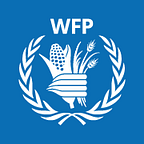Haiti: UNHAS helicopter brings aid to a remote island in the north
For the first time, the UN Humanitarian Air Service has reached Tortuga island to deliver WFP’s cash assistance for 11,000 people
By Myriame François
Off the far north coast of Haiti lies the small island of Tortuga. Over 13 kilometres of sea separate its 35,000 inhabitants from the nearest town of Port-de-Paix. Getting there used to mean a calculated task of going in local boats, which wasn’t always possible or a reliable means of transportation. It also hampered attempts by WFP to assist the population. This year things changed with the arrival of the UNHAS helicopter, allowing personnel and humanitarian assistance to reach the island and bring relief to people in need.
Ilerson Louis is a former bricklayer who used to build houses for the people of his village. Now in his eighties, a father of nine with 17 grandchildren, his health is declining and he is unable to keep up his former job. The two cash payments he received gave him the flexibility he needed to care for his wife, who is blind, and himself. “If there is no gas, we can use the money to buy gas. If there is no salt, we can use the money to buy salt”.
Like for many people of the Caribbean Island, living conditions have deteriorated. A poor economic and security context is compounded by climate shocks and the long-term impact of disasters such as hurricane Matthew in 2016 and the 2010 earthquake before that. The COVID-19 crisis and associated restrictions have also affected economic activity and livelihoods in these areas.
As a result, this assistance turns out to be crucial to make lose ends meet in many different ways for people in the north, empowering and giving them autonomy. “With the cash, I also bought a pig, and she’s already given birth to two more,” he says, glad to have been able to improve his family’s situation on the short but also the longer term, and allowing him a little more respite.
The provision of cash also means that it is recirculated into local economies.
When Ilerson Louis and the thousands of others on the island use this money to buy food, oil or other items at the local market, it helps farmers, fishing communities and local markets survive.
It’s the first time that WFP, working closely with the Directorate for Civil Protection (DCP) who has a se solid experience in effectively coordinating these kinds of operations, was able to intervene on the island. Thanks to this collaboration with local authorities and partners on the ground, it will not be the last. This assistance was funded by Canada.
In 2021, WFP assisted more than 50,000 people in the North West department with emergency assistance.
This year, Canada is funding several of the World Food Programme’s activities, including emergency assistance, schoolfeeding and UNHAS. In 2021, UNHAS was supported by Canada, the European Union, France, Germany, Japan, Switzerland, the United Nations Central Emergency Response Fund (CERF) and the US Agency for International Development (USAID/BHA).
